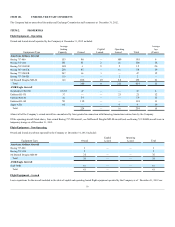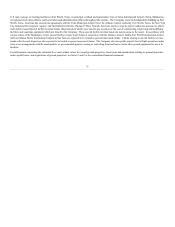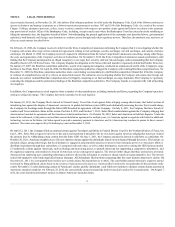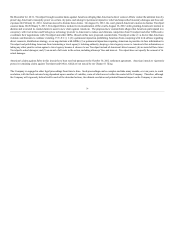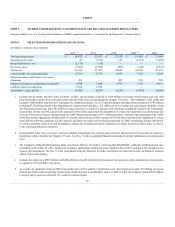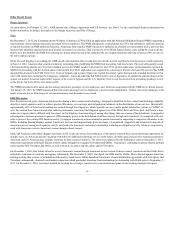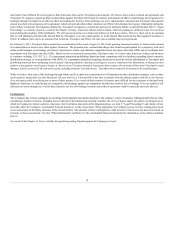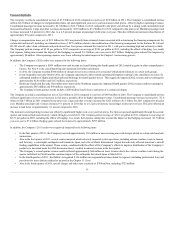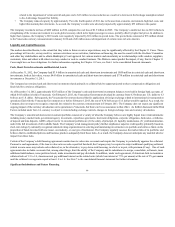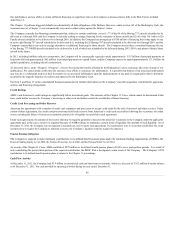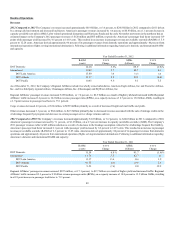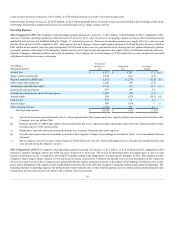American Airlines 2012 Annual Report Download - page 40
Download and view the complete annual report
Please find page 40 of the 2012 American Airlines annual report below. You can navigate through the pages in the report by either clicking on the pages listed below, or by using the keyword search tool below to find specific information within the annual report.
Other Recent Events
Merger Agreement
As noted above, on February 13, 2013, AMR entered into a Merger Agreement with US Airways. See Note 17 to the consolidated financial statements for
further information, including a description of the Merger Agreement and Plan of Merger.
Other
On December 7, 2011, the Communications Workers of America (CWA) filed an application with the National Mediation Board (NMB) requesting a
representation election among American's passenger service employees. The NMB subsequently concluded that the CWA had submitted a sufficient showing
of interest to permit an NMB-authorized election. American, believing the NMB's decision to authorize an election was inconsistent with a new law that
increased the minimum required showing of interest necessary for an election, filed a lawsuit in a Fort Worth federal district court, asking the court to declare
that the new law prohibits the NMB from ordering an election unless the union has submitted the new required minimum showing of interest (50% or more of
the entire employee group).
While the court litigation was pending, the NMB issued a determination that it would proceed with the election, and that the election process would commence
on June 14, 2012. American then secured a temporary restraining order prohibiting the NMB from proceeding with the election. The court subsequently issued
a decision declaring that the new 50 percent standard governs the NMB's conduct with respect to the CWA's election application, and permanently enjoined the
NMB from proceeding with the election unless it determined the CWA's application was supported by a showing of interest of at least fifty percent. The NMB
appealed this decision to the Fifth Circuit U.S. Court of Appeals, and a panel of that court vacated the district court's decision and remanded the matter to that
court with instructions to dismiss the Company's complaint. American asked the full Fifth Circuit Court of Appeals to reconsider the panel's ruling, but the
request was denied. American made further requests of the Court of Appeals and the U.S. Supreme Court to stop the election from proceeding pending a review
on the merits, but those efforts were unsuccessful.
The NMB proceeded with a union election among American's passenger service employees, and American cooperated with the NMB in its election process.
On January 15, 2013, the NMB announced that American's passenger service employees voted to remain independent. Neither side raised challenges to the
results of the election or filed charges of election interference, and the matter is now closed.
GDS Discussion
Over the past several years, American has been developing a direct connection technology, designed to distribute its fare content and bookings capability
directly to travel agents in order to achieve greater efficiencies, cost savings, and technological advances in the distribution of our services. Historically,
approximately 60% of American's bookings are booked through travel agencies, which typically use one or more global distribution systems, or “GDSs”, to
view fare content from American and other industry participants. American filed litigation against two of the GDSs, Sabre and Travelport, and Orbitz, a large
online travel agency that is affiliated with Travelport. In that litigation, American alleged, among other things, that one or more of the defendants (1) engaged in
anticompetitive business practices to preserve GDS monopoly power in the distribution of airlines services through travel agencies; (2) conspired with each
other to preserve the existing GDS business model; (3) engaged in numerous actions intended to punish American for supporting a competitive alternative to the
GDSs, including biasing displays against American's services and imposed large price increases, (4) organized, supported, and monitored a boycott of
American services among travel agencies; and (5) interfered with American's contractual relationships, including an obligation owed by Orbitz to cooperatively
work with American to receive American's content through a direct connect.
Sabre and American settled their disputes in October 2012. Under the terms of the settlement, (i) the parties renewed their current distribution agreement for
multiple years, (ii) American agreed to negotiate with Sabre for additional technology services in the future, (iii) Sabre agreed to provide a monetary payment to
American, and (iv) American may continue to pursue its direct connect initiative. The terms were approved by the bankruptcy court on December 5, 2012.
American's agreement with Sabre did not resolve claims brought by or against Travelport and Orbitz. American is continuing to pursue federal antitrust
claims against both Travelport and Orbitz, as well as breach of contract and tort claims against Travelport.
On November 1, 2010, after Orbitz refused to receive American's content through American's newest version of direct connect, American notified Orbitz that it
intended to terminate its contracts and agency relationship. On November 5, 2010, Travelport, the GDS used by Orbitz, filed a lawsuit against American
seeking a ruling that a notice of termination delivered by American to Orbitz breached American's content distribution agreement with Travelport, and
Travelport subsequently obtained a preliminary injunction which precluded American from terminating its relationship with Orbitz prior to September 1,
2011. On December 3, 2010, Travelport doubled the booking fees it charges American for some international point-of-sale bookings through Travelport,
40


